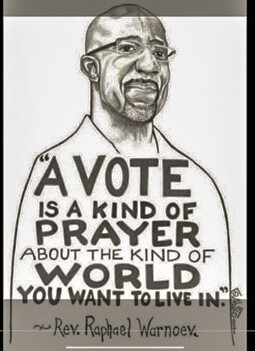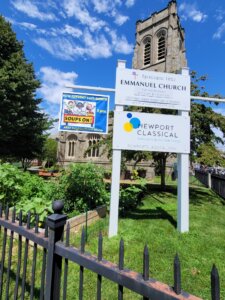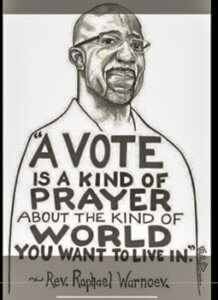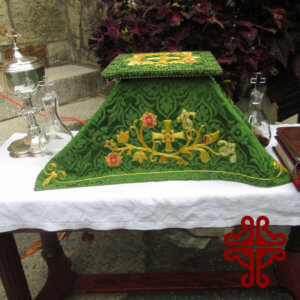
Building Beloved Community
This past week, we returned to our Fall schedule here at Emmanuel.
 Newport Classical held its first of 15 concerts in the chamber series Friday night, with the Recital Hall filled to capacity. The Stewardship Committee announced a Fall Celebration dinner September 20, with an amazing menu by our own Emily Wigutow, cooking in the Emmanuel kitchen — get your tickets now, they’re going fast! And reNEWPORT, our community’s council of civic and nonprofit leaders, met Wednesday in the Emmanuel Library, with Mayor Xay in attendance, bringing us up to date on all we’re doing together to help our community thrive. ReNEWPORT’s first project is to build up and strengthen the public school, as a strong public school system is a basic public good, not only for the students and their families, but for every member of the community.
Newport Classical held its first of 15 concerts in the chamber series Friday night, with the Recital Hall filled to capacity. The Stewardship Committee announced a Fall Celebration dinner September 20, with an amazing menu by our own Emily Wigutow, cooking in the Emmanuel kitchen — get your tickets now, they’re going fast! And reNEWPORT, our community’s council of civic and nonprofit leaders, met Wednesday in the Emmanuel Library, with Mayor Xay in attendance, bringing us up to date on all we’re doing together to help our community thrive. ReNEWPORT’s first project is to build up and strengthen the public school, as a strong public school system is a basic public good, not only for the students and their families, but for every member of the community.
How does that work? Strong public school systems not only equip a work force, they also build strong leaders, engaged, informed, and conscientious voters, and community members and neighbors who have each other’s best interest at heart. Mayor Xay stressed what we already know at Emmanuel — we’re in this together. Our welfare is inextricably linked — to each other, to the wider community, to the world beyond it, to our natural environment, and to God.
Understanding Our Interdependence
Understanding our interdependence is more important in this season of choice in leadership and direction than ever. And it just doesn’t work to isolate ourselves, building sturdy walls around our own comfort zones. When we do that, we close the door on our own echo chambers, talking only to the people who agree with us already. And we also miss that holy opportunity of connection. This connection is what Dr. Martin Luther King, Jr. called building Beloved Community, and it means engaging our faith to change the world by seeing, and honoring, each other’s humanity. U.S. Sen. Raphael Warnock from Georgia preached at St. Paul’s Cathedral in London on September 1, commemorating the sixtieth anniversary of Dr. King’s sermon on creating beloved community from that same pulpit.
 Sen. Warnock, like Dr. King and Daddy King before him, is the senior pastor at Ebenezer Baptist Church in Atlanta, and part of a long tradition of walking our faith in the public square that began with the prophets we know from the Old Testament. [While I can’t find a video of Sen. Warnock’s sermon, there is a recording of his excellent lecture at St. Paul’s the evening before, featuring an introduction by The Very Rev. Andrew Tremlett, Dean of St. Paul’s, London and husband of our own Maggi Dawn, who was sitting beside him.]
Sen. Warnock, like Dr. King and Daddy King before him, is the senior pastor at Ebenezer Baptist Church in Atlanta, and part of a long tradition of walking our faith in the public square that began with the prophets we know from the Old Testament. [While I can’t find a video of Sen. Warnock’s sermon, there is a recording of his excellent lecture at St. Paul’s the evening before, featuring an introduction by The Very Rev. Andrew Tremlett, Dean of St. Paul’s, London and husband of our own Maggi Dawn, who was sitting beside him.]
Faith in action is a full body sport. As Jewish theologian Rabbi Abraham Joshua Heschel memorably said on his return from marching with Dr. King in Selma, I felt my legs were praying. Sen. Warnock makes a similar point in our times: A vote is a prayer for the kind of world you want to live in. Now stay with me here — take a breath. I’m not advocating for one ticket or another in any race or on any issue — because that doesn’t work, and besides, it’s just not that simple. Each of us has to pray with our own whole self. What I’m saying is that we must all carry our faith out into our lives, as our reading from Proverbs tells us this morning: Wisdom cries out in the street, in the squares, at the entrance to the city gates, and in the voting booth.
When we build beloved community by God’s dimensions of length, breadth, and height — where the length of life is love of self, the breadth is love of neighbor — a broad concern for the welfare of others and the height is our upward reach for God — we become what we pray. These are Dr. King’s Dimensions of a Complete Life that he preached at St. Paul’s 60 years ago. And when we can see and feel our shared humanity — even through all kinds of difference — that’s when we start building our complete lives by God’s dimensions. The breadth of life — a broad concern for the welfare of others — includes what we say or write, and what we read and share. Words matter. As James’s letter this morning says, the violence we can do with words is enormous.
How great a forest is set ablaze by a small fire!
And the tongue is that fire.
With it we curse others,
who like us are made in the likeness of God.
So let’s listen to our prayers and become what we pray as we walk in the world, even as we encounter others who live, think, and vote differently than we do, and even when we disagree.
Baptismal Covenant
For Episcopalians, our baptismal covenant is a great start. Every time there’s a baptism, we, or our godparents in our behalf, and our whole community then around us, say and mean the baptismal covenant. To try every day to do our best for each other, say sorry when we’re wrong, and try even harder next time. To proclaim by word and example the Good News of God walking among us, to look, and care, for God in all persons, and to love our neighbor as ourselves. And here’s the big one: to strive for justice and peace among all people, and respect the dignity of every human being. None of this is easy. And that’s exactly what Jesus is telling the disciples in our gospel reading today, as he describes the rough road they’ll take to Jerusalem immediately after this conversation, following through with absolute integrity to ultimate consequences.
This commitment to building beloved community takes connecting with the humanity of others — even those who have different backgrounds and experiences, and even our neighbor who disagrees with us. Notice where Jesus and the disciples are for today’s ride or die conversation. They’re not in their hometown, among their local folks, in the rural fishing villages around the Sea of Galilee. They’ve made their way up into the Golan Heights, inside first century Syria, just miles from the Lebanon border, to Caesarea Philippi, the headquarters of Rome’s land based military occupation of the Land of Israel — naval headquarters were at Caesarea Maritima, about 100 miles southwest on the coast.
 Is Jesus teaching the disciples, and us listening in now, to manage our politics by avoiding difference? Just the opposite, I think, and his conversation with the Syrophoenician woman in last week’s reading from Mark’s gospel plays that out clearly: Jesus shared his missional and political priority for the poor, and the more affluent Syrophoenician woman empathized, making space in her heart for the hungry children of Israel. Immediately the demon left her daughter. And no, this isn’t easy. We can’t just consider one side. Building beloved community includes an understanding that need does not, in and of itself, create resources to meet it. Healthy economies, and everything they take to support them, are necessary to sustain God’s dimensions of a complete life.
Is Jesus teaching the disciples, and us listening in now, to manage our politics by avoiding difference? Just the opposite, I think, and his conversation with the Syrophoenician woman in last week’s reading from Mark’s gospel plays that out clearly: Jesus shared his missional and political priority for the poor, and the more affluent Syrophoenician woman empathized, making space in her heart for the hungry children of Israel. Immediately the demon left her daughter. And no, this isn’t easy. We can’t just consider one side. Building beloved community includes an understanding that need does not, in and of itself, create resources to meet it. Healthy economies, and everything they take to support them, are necessary to sustain God’s dimensions of a complete life.
We start here at home, right next to us in the pews, gathering around shared bread and wine. Belonging builds our capacity to listen in love and curiosity to others whose lives are different from ours, creating relationship. Relationship creates empathy, which is no less than the key to our survival as human beings. It’s really that big a deal. Of course it’s not easy. Just listen to what Jesus said to the disciples about the hard way of the cross. But when compassion touches the humanity of those who are far from us — by distance, custom, background, experience, or political beliefs — just as it rushes to a beloved among us who has suffered an unimaginable pain, we’ve taken up the cross and started praying with our whole selves. Amen
